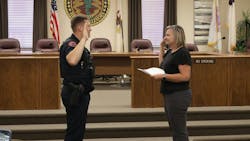Ill. Police Department Becomes 1st in State to Hire Through Military Reciprocity Program
What to know
-
The Herrin Police Department hired former Kevin R. Bailey, a former Army military police officer, under Illinois' new military police reciprocity program.
-
The initiative, launched this year, lets qualified veterans substitute military training for portions of the state’s police academy while completing additional state requirements.
-
Chief David Dorris said the program recognizes veterans’ experience and could help departments address staffing shortages statewide.
HERRIN, IL — The Herrin Police Department has become the first in Illinois to hire an officer through the state’s new military police reciprocity program.
At a swearing-in ceremony Sept. 17 at Herrin City Hall, Officer Kevin R. Bailey, a former U.S. Army military police officer, officially joined the department under the new pathway.
Herrin Police Chief David Dorris said the milestone wasn’t planned but happened because of Bailey’s application. Dorris reached out to the training board to see if Bailey’s VA credentials would qualify, and he learned the new program was just beginning.
“They told me the program was kicking off, and he met the qualifications,” Dorris said.
Dorris described Bailey as a natural fit for the department, pointing to his background and values as reasons he was chosen. The chief said Bailey’s drive and commitment stood out during the hiring process.
“His character matches ours,” Dorris said. “He believes in the mission of protecting and serving the citizens of Herrin.”
Bailey, who is originally from Indiana, worked nearly two years with the Transportation Security Administration before enlisting in the Army. He served five years as a military police officer on active duty, followed by three years in the Reserves before leaving the military in 2022.
“I exited the military in 2022 and have lived here in Southern Illinois with my wife,” Bailey said. “The main reason I chose this location was the family aspect, being close to my wife’s family and mine.”
Law enforcement had long been his goal, Bailey said, and his military service gave him the skills to pursue it. What he needed, he explained, was to learn the civilian side of the profession.
“I always wanted to pursue law enforcement,” Bailey said. “After the military, I just pursued what I already knew.”
When Bailey interviewed in Herrin, he learned about the reciprocity program for the first time. The news came as a relief but also added weight to the moment.
“It was great news for me, but it put a bit of pressure on me since I was the first in the state to go through it,” he said.
The program, established earlier this year by the Illinois Law Enforcement Training and Standards Board, allows qualified veterans to substitute military training for portions of the state’s 640-hour Basic Law Enforcement Academy.
Candidates must still complete several state requirements, including the Illinois Law for Police course, a two-day sexual assault investigation course, 40 hours of firearms and use-of-force training, and the Illinois Certification Exam.
Dorris said the program matters because it finally recognizes the training military police already receive. He noted that before this policy, veterans had to start over despite years of service.
“You can spend four years as a military police officer and then come back to Illinois and be told none of that counts,” Dorris said. “This program finally acknowledges their hard work.”
He added that the pathway could help other agencies facing staffing shortages. While Herrin is fully staffed, he said the initiative creates opportunities for departments that struggle to recruit.
“It opens up a whole new pool of candidates with maturity, training and world experience,” Dorris said.
Bailey said his military background has eased the transition into local law enforcement. He sees clear similarities between the two, particularly in structure and mission.
“Being able to adapt to any situation and being trainable has been a major help for me,” he said.
He also said he takes pride in being the first to benefit from the program.
“I feel honored and fortunate to be the first officer under the reciprocity program,” Bailey said.
Keith Calloway, executive director of the state board, said the initiative was designed to respect veterans’ service while addressing hiring needs across Illinois.
“This is about honoring their experience while meeting our state’s workforce needs,” Calloway said.
Illinois became the 19th state to approve such a reciprocity measure when lawmakers passed the policy in May.
Dorris said Bailey’s addition has already made a difference in Herrin.
“Herrin is lucky to have him,” Dorris said. “He’s a great asset to the department and the community.”
__________________
© 2025 The Southern Illinoisan, Ill.
Visit www.thesouthern.com.
Distributed by Tribune Content Agency, LLC.
